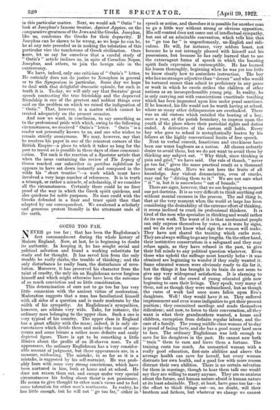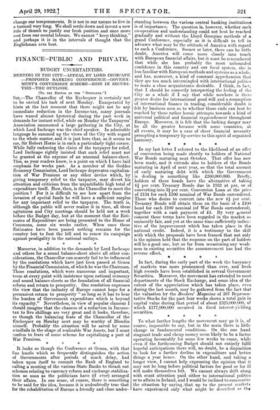GOING TOO FAR.
NMrER go too far ; that has been the Englishman's first commandment during the whole history of Modern England. Now, at last, he is beginning to doubt its authority. In keeping it, he has sought social and political salvation and found a working substitute for study and for thought. It has saved him from the only trouble he really shirks,-the trouble of thinking; and the only disturbance he really fears, the disturbance of revo- lution. Moreover, it has preserved his character from the taint of cruelty, the only sin an Englishman never forgives himself and which might otherwise have been the outcome of so much conviction and so little consideration. - This determination of ours not to go too far has very little connexion with the ancient virtue of moderation. Moderation suggests that a man has familiarized himself with all sides of a question and is made moderate by the width of his sympathy. An Englishman's sympathies, however, are seldom very wide. Take, for instance, the ordinary man belonging to the upper class. Such a one is very typical of his country. The upper class in England has a great affinity with the mass; indeed, it is only cir- cumstances which divide them and make-the man of some means and some leisure a rather more definite and easily depicted figure. There is apt to be something a little illusive about the profile of an ill-shaven man. To all appearance, the ordinary Englishman •has a very consider- able amount of judgment, but these appearances are, in a measure, misleading. The mistake, in so far as it is a mistake, is suggested by his self-restraint. He was prob- ably born with some very strong convictions, which have been nurtured in him, both at home and at school. He does not reason them out, and except under very special circumstancea• his feeling about theme is not passionate. He seems to give thought to other men's views and to feel some toleration for other men's sentiments. In reality, he has little enough,- but he will not " "go too far," either in speech or action, and therefore it is possible for another man to go a little way without strong or obvious- opposition. His self-control does not come out of intellectual sympathy, but out of an admirable convention, which tells him that to " go too far " is ungentlemanly, un-English and ridi- culous. He will, for instance, very seldom boast, not because he is not intensely pleased with himself and his possessions, but because he has early learned that to use the extravagant forms of speech in which the boastina spirit finds expression is contemptible. He has learned his lesson thoroughly, beginning when he was yet too little to know clearly how to assimilate instruction. The boy who has no stronger adjective than " decent " and who would be tortured sooner than admit to proficiency in any game or work in which he excels strikes the children of other nations as an incomprehensible young prig. In reality, he is only carrying out with conscientious exactitude teaching which has been impressed upon him under penal sanctions. If he boasted, his life would not be worth having at school, where so many other delinquencies are overlooked. There was an old custom which entailed the beating of a boy, once a year, at the parish boundary, to impress upon the youth of the place where their parochial rights and duties ended. A derivative of the custom still- holds. Every boy who goes to school is metaphorically beaten by his fellows at the highly conventional limits of free speech.
Next to verbal conceit, fanaticism and crankiness have been our worst bugbears as a nation. All classes ardently desire to avoid them, but we do not want to avoid them by thinking any subject out. " Why think, since thinking is pain and grief," we have said. Our rule of thumb, " never go too far," gives the same practical result as a thousand hours of thought. Have we not here the fruits of all knowledge. Any violent denunciation, even of cranks, may end by " driving them to it." We are not sure what " it " is, but it is somewhere " out of bounds."
There are signs, however; that we are beginning to suspect our pet doctrine. It is so very difficult to think anything out without mental excesses in the process. The sad thing is, that at the very moment when the world at large has been considering the desirability of the extreme effort of thinking, it seems inclined to crush its professional thinkers. It is tired of the men who specialize in thinking and would rather do its own work. The worst of it is that uneducated people can only express themselves by votes, as it were by signs, and we do not yet know what sign the women will make. They have not shared the training which curbs men. They are always willing to go any lengths. On the other hand, their instinctive conservatism is a safeguard and they may refuse again, as they have refused in the past, to give their full minds to any political question whatever. Even those who upheld the suffrage most heartily befoi , it was obtained are beginning to wonder if they really wanted it. Some educated women were obviously ready to die for it, but the things it has brought in its train do not seem to give any very widespread satisfaction. It is alarming to hear the talk of the crowd of young educated girls now beginning to earn their livings. They speak, very many of them, not as though they were enfranchised,- but as though the curse of work had once more fallen upon Eve's daughters. Well ! they would have it so. They suffered imprisonment and even worse indignities to get their present position ; they committed sacrilege and made themselves ridiculous ; and now, to listen to their conversation, all they want is what their grandmothers wanted, a house and children, exemption from definite regular labour, and the care of a family. The young middle-class woman of to-day is proud of facing facts, and she has a good many hard ones to face. The ordinary Englishman was loth enough to save for his daughters in the past. He cannot now both " train " them to earn and leave them a fortune. The training costs too much. An unmarried woman with a really good education, first-rate abilities and above the average health can save for herself, but every woman distrusts her own health, and a good few with more reason distrust their own abilities. There is no certain salvation for them in marriage, though to hear them talk one would say theynre willing to marry anyone. They are so anxious about the future, and human nature afraid is human nature at its least admirable. They, at least, have gone too far—in the effort to think things out—so, no doubt, will their brothers and fathers, but whatever we change we cannot change our temperaments. It is not in-our nature terlive in a turmoil very long. We shall settle down and invent a new rule of thumb to justify our fresh position and once more rest from our mental labours. We cannot " keep thinking," and perhaps it is in the intervals of thought that the Englishman acts best.



































 Previous page
Previous page